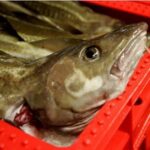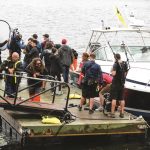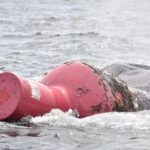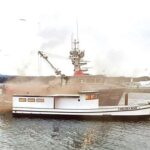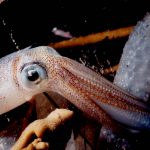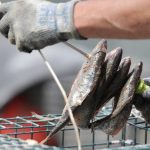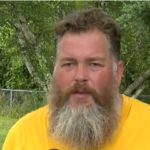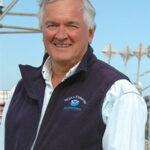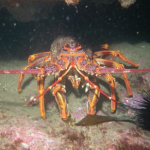Daily Archives: October 6, 2016
Toxic algae bloom closes Downeast Maine shellfish industry
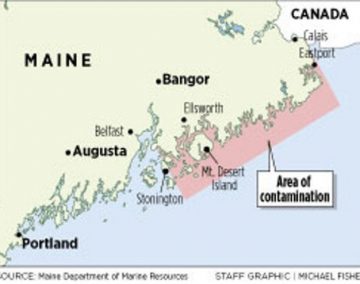 Last week, the Department of Marine Resources issued a recall of mussels, clams and quahogs caught in Downeast Maine after samples tested positive for domoic acid, a biotoxin that causes illness, memory loss, brain damage and possibly death in humans. At the same time, the state banned harvesting for mussels, clams, oysters and carnivorous snails on parts of a wide swath of coastline from Deer Isle to the Canadian border. “A closure for this toxin in Eastern Maine is unprecedented, that is not anything anyone has ever seen,” said Darcie Couture, a Brunswick marine scientist and former head of the state’s marine biotoxin program. “No one on this coast is that experienced with a domoic acid event,” Couture said. “I don’t think it is sinking in how serious this is.” Read the story here 23:07
Last week, the Department of Marine Resources issued a recall of mussels, clams and quahogs caught in Downeast Maine after samples tested positive for domoic acid, a biotoxin that causes illness, memory loss, brain damage and possibly death in humans. At the same time, the state banned harvesting for mussels, clams, oysters and carnivorous snails on parts of a wide swath of coastline from Deer Isle to the Canadian border. “A closure for this toxin in Eastern Maine is unprecedented, that is not anything anyone has ever seen,” said Darcie Couture, a Brunswick marine scientist and former head of the state’s marine biotoxin program. “No one on this coast is that experienced with a domoic acid event,” Couture said. “I don’t think it is sinking in how serious this is.” Read the story here 23:07
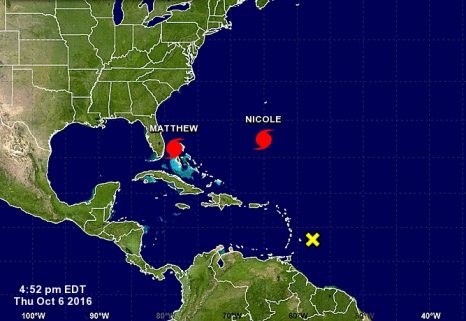
Oct 6, 2016 17:00 EDT – Hurricane Matthew Approaching the Southeast U.S. Coast
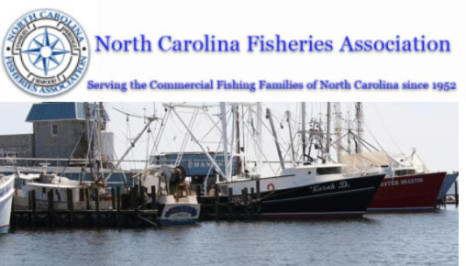
BREAKING NEWS From North Carolina Fisheries Association – JUDGE RULES IN OUR FAVOR!!!
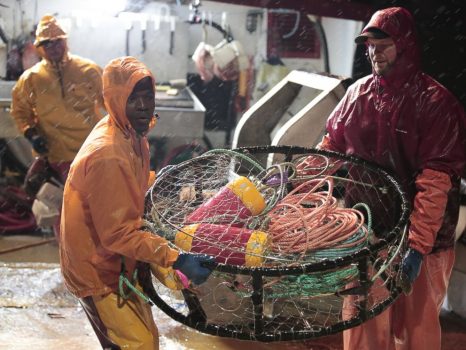
Inside One of the World’s Most Dangerous Jobs
Up to 10 inches wide -– some weighing almost 3 pounds — with 10 legs and of course, claws that can break a finger — Dungeness crab fishing is not for the faint of heart. Add to that the unforgiving weather and potentially tumultuous relationships on board the boats, the situation can become dangerous and deadly at times. No one knows that better than Captain Gary ‘the Ripper’ Ripka and his son Kenny, who own and operate two commercial fishing boats in Newport, Oregon, the Dungeness Crab Capital of the World. “It’s a pretty high-risk job, the most dangerous job in the world,” Gary Ripka told ABC News’ Chief Business, Economics and Technology Correspondent Rebecca Jarvis on a recent episode of Real Biz with Rebecca Jarvis. Video, read the rest here 16:07
Head of UCIDA hopes for fisheries plan based on 10 MSA national standards
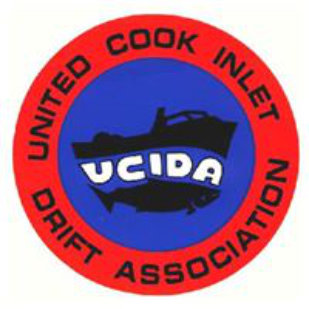 After the well-publicized court win by commercial fishing groups requiring the North Pacific Fishery Management Council to work with the state to establish a Fisheries Management Plan for salmon fisheries that take place largely in federal waters complying with the Magnuson-Stevens Act, the question is, now what? That will be a topic of discussion at the council meeting taking place this week. In the meantime, David Martin, president of United Cook Inlet Drift Association, one of the groups that filed and funded the suit, commented on what some of the issues are, and the thinking behind the suit. While the suit is still open to the appeals process, after having won a unanimous decision from the Ninth Circuit, the state has expressed reluctance to appeal. Read the story here 15:11
After the well-publicized court win by commercial fishing groups requiring the North Pacific Fishery Management Council to work with the state to establish a Fisheries Management Plan for salmon fisheries that take place largely in federal waters complying with the Magnuson-Stevens Act, the question is, now what? That will be a topic of discussion at the council meeting taking place this week. In the meantime, David Martin, president of United Cook Inlet Drift Association, one of the groups that filed and funded the suit, commented on what some of the issues are, and the thinking behind the suit. While the suit is still open to the appeals process, after having won a unanimous decision from the Ninth Circuit, the state has expressed reluctance to appeal. Read the story here 15:11
Canada’s Bluefin Tuna Management: Time to Get it Right
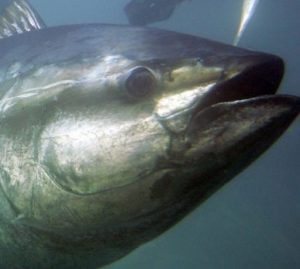 Back in August, Fisheries and Oceans Canada (DFO) released its recommendations on whether or not to list several marine species as endangered or threatened under the Species At Risk Act (SARA)—one of which was Atlantic bluefin tuna. Listing under SARA means the species is protected under Canadian law, and it becomes illegal to kill, harm, harass, capture or take an individual and prohibits the possession or trade of products made from them. DFO’s recommendation on bluefin was to not list bluefin under the Act, mostly citing the socio-economic impacts that would result from closing the Atlantic Canadian bluefin fishery if listed. Regardless of whether the government lists the species on SARA or not, these bluefin need more attention as they are currently at just 55% of their already depleted 1970s levels. Read the story here 14:02
Back in August, Fisheries and Oceans Canada (DFO) released its recommendations on whether or not to list several marine species as endangered or threatened under the Species At Risk Act (SARA)—one of which was Atlantic bluefin tuna. Listing under SARA means the species is protected under Canadian law, and it becomes illegal to kill, harm, harass, capture or take an individual and prohibits the possession or trade of products made from them. DFO’s recommendation on bluefin was to not list bluefin under the Act, mostly citing the socio-economic impacts that would result from closing the Atlantic Canadian bluefin fishery if listed. Regardless of whether the government lists the species on SARA or not, these bluefin need more attention as they are currently at just 55% of their already depleted 1970s levels. Read the story here 14:02
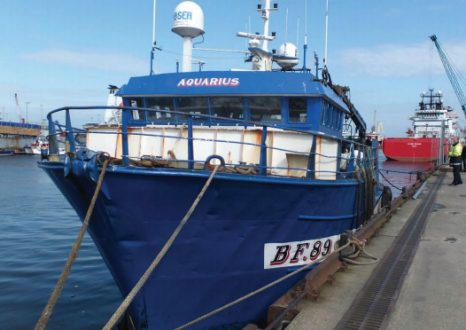
Safety failings on fishing trawler Aquarius led to fisherman’s death
An investigation has revealed that the twin rig trawler, Aquarius was “a poorly run vessel”, issued with 137 deficiencies in the years prior to the death of Nuertey Annang. The Ghanaian-born fisherman, who was 47, died on 17 August 2015 when a rope stopper parted and he was thrown “violently” overboard. The vessel was around two miles east of Aberdeen harbour in Scotland when the incident happened. Despite searches, Annang’s body was never found. A report by the Marine Accident Investigation Branch (MAIB) identifies that “The skipper and owners of Aquarius consistently prioritised the catching of fish over the safety of the vessel and its crew. This resulted in the promotion of a poor safety culture.” It found that the crew, nor their vessel “had been adequately prepared to deal with such emergency situations.” Read the story here 13:40
Obama’s new ocean preserves are bad for the environment and for people
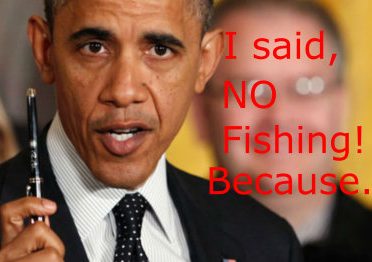 Who wants to save the oceans? Short answer: everyone, especially politicians. A less frequently asked question is whether their high-profile efforts always work. Right now, world leaders seem to want to see who can declare the biggest marine protected areas, or MPAs, in their territory. MPAs are kinds of national parks for sea life that extends from ocean surface to ocean floor. Commercial fishing and other undersea ventures are banned in them. They are popping up everywhere. In August, President Obama announced one in the western Pacific Ocean that is 50 per cent bigger than Texas. In September he created another, more modest one off the coast of New England. Britain announced yet another MPA in September around St. Helena Island in the south Pacific. It is half the size of the Lone Star State. In fact, the MPA movement has become a religion with accepted articles of faith that more and bigger are better. This current obsession is bad for the oceans, bad for the global environment, and bad for people. Consider what the imposition of an MPA can do to the economy and livelihood of local fishers, who are unable to easily pick up and move elsewhere. Some fishermen in New England are warning that they could go out of business as a result of the new Atlantic marine preserve. Read the op-ed here 10:48
Who wants to save the oceans? Short answer: everyone, especially politicians. A less frequently asked question is whether their high-profile efforts always work. Right now, world leaders seem to want to see who can declare the biggest marine protected areas, or MPAs, in their territory. MPAs are kinds of national parks for sea life that extends from ocean surface to ocean floor. Commercial fishing and other undersea ventures are banned in them. They are popping up everywhere. In August, President Obama announced one in the western Pacific Ocean that is 50 per cent bigger than Texas. In September he created another, more modest one off the coast of New England. Britain announced yet another MPA in September around St. Helena Island in the south Pacific. It is half the size of the Lone Star State. In fact, the MPA movement has become a religion with accepted articles of faith that more and bigger are better. This current obsession is bad for the oceans, bad for the global environment, and bad for people. Consider what the imposition of an MPA can do to the economy and livelihood of local fishers, who are unable to easily pick up and move elsewhere. Some fishermen in New England are warning that they could go out of business as a result of the new Atlantic marine preserve. Read the op-ed here 10:48
Push for new FISH-NL fishermen union an opportunistic ‘raid’ of FFAW, claims president of the Canadian Labour Congress
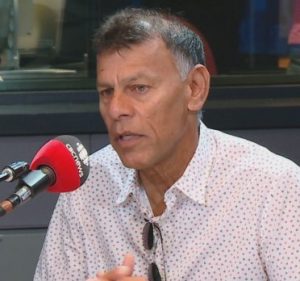 The president of one of Canada’s biggest labour groups says he’s justified in calling Ryan Cleary opportunistic for trying to start a new fishers union separate from the Fish, Food and Allied Workers Union (FFAW). Hassan Yussuff, president of the Canadian Labour Congress (CLC), wrote a letter to Cleary on Monday where he described the former MP’s attempts to start a new union as a “raid” on the current FFAW membership. Yussuff dismisses Cleary’s claim that the letter was harsh and included personal attacks. “He’s trying to raid that union to create his own union for his own purposes, in my view,” Yussuff told the St. John’s Morning Show. “We have a process in the CLC structure to address issues that members raise, and we have not received any complaint from the members of that union.” Read the story here 09:22
The president of one of Canada’s biggest labour groups says he’s justified in calling Ryan Cleary opportunistic for trying to start a new fishers union separate from the Fish, Food and Allied Workers Union (FFAW). Hassan Yussuff, president of the Canadian Labour Congress (CLC), wrote a letter to Cleary on Monday where he described the former MP’s attempts to start a new union as a “raid” on the current FFAW membership. Yussuff dismisses Cleary’s claim that the letter was harsh and included personal attacks. “He’s trying to raid that union to create his own union for his own purposes, in my view,” Yussuff told the St. John’s Morning Show. “We have a process in the CLC structure to address issues that members raise, and we have not received any complaint from the members of that union.” Read the story here 09:22
West Australian Government accused of basing decision not to reopen commercial shark fishery on politics, not science
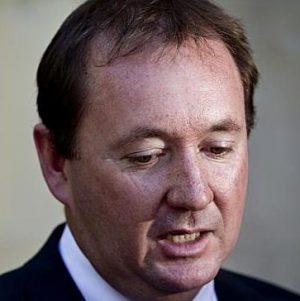 Fisheries Minister Joe Francis said the fishery would remain closed. “Reopening the metropolitan shark fishery is frequently touted as an indirect method of reducing white shark numbers and the risk of attacks. However, the evidence doesn’t support this,” he said in a statement. A spokeswoman for the fisheries department said Mr Francis’s comment was not based on a study by the department. The Western Australian Shark Fishing Association also believed politics was behind the Government’s decision. “It’s got nothing to do with the stock sustainability issue,” president Brian Scimone said. “It’d be a public thing, a political thing, a recreational thing.” Mr Scimone said shark numbers had built up due to a lack of fishing. “The public, the recreational fishing section, the Government, the fisheries associated with the Government, should start listening to the shark fishermen,” he said. “Bring our quotas back into consideration for use and let us do us our job in a sustainable fishery. Read the story here 08:21
Fisheries Minister Joe Francis said the fishery would remain closed. “Reopening the metropolitan shark fishery is frequently touted as an indirect method of reducing white shark numbers and the risk of attacks. However, the evidence doesn’t support this,” he said in a statement. A spokeswoman for the fisheries department said Mr Francis’s comment was not based on a study by the department. The Western Australian Shark Fishing Association also believed politics was behind the Government’s decision. “It’s got nothing to do with the stock sustainability issue,” president Brian Scimone said. “It’d be a public thing, a political thing, a recreational thing.” Mr Scimone said shark numbers had built up due to a lack of fishing. “The public, the recreational fishing section, the Government, the fisheries associated with the Government, should start listening to the shark fishermen,” he said. “Bring our quotas back into consideration for use and let us do us our job in a sustainable fishery. Read the story here 08:21
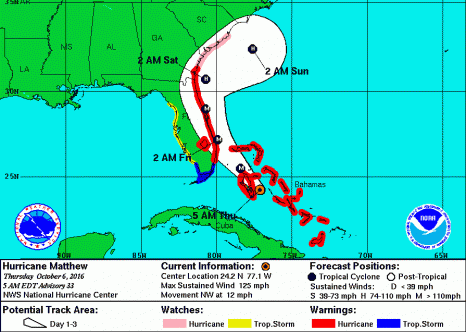
The Latest on Hurricane Matthew 0:500 EDT THU OCT 06 2016
CHANGES WITH THIS ADVISORY: The Hurricane Warning has been extended northward to Altamaha Sound, Georgia, and the Hurricane Watch has been extended northward to South Santee River, South Carolina. At 500 AM EDT (0900 UTC), the center of Hurricane Matthew was located near latitude 24.2 North, longitude 77.1 West. Matthew is moving toward the northwest near 12 mph (19 km/h), and this general motion is expected to continue today. A turn toward the north-northwest is expected tonight. On the forecast track, the eye of Matthew should pass near Andros Island and New Providence in the northwestern Bahamas early this morning, then pass near Grand Bahama Island late today, and move very close to the east coast of the Florida peninsula tonight through Friday night. Read the advisory here 07:18 Be prepared.


































